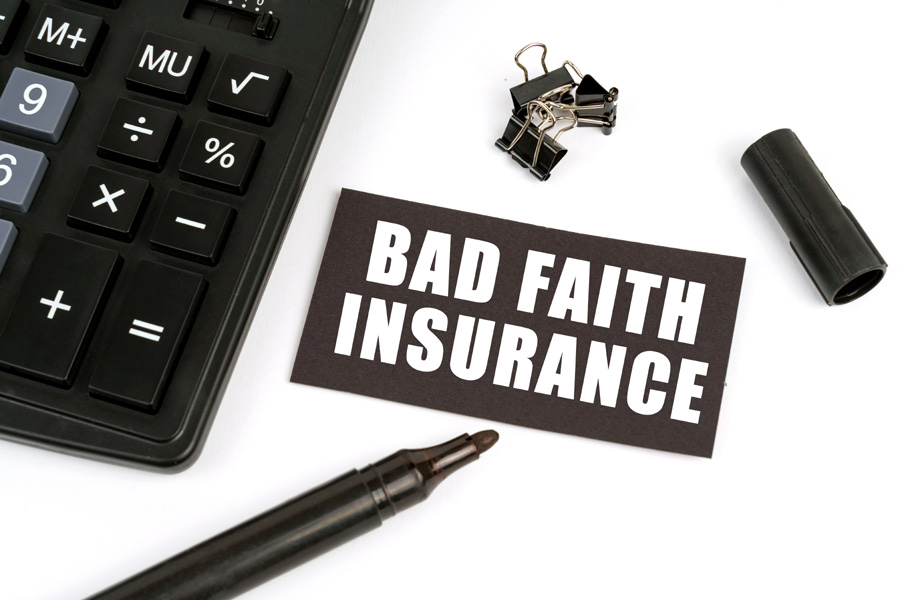Your insurance company is legally obligated to act in good faith toward you when attempting to settle your case. When dealing with your insurance company, you must be aware of bad faith practices that can undermine your right to a fair settlement.
If you believe your insurance company is not treating you as it should, including being unwilling to provide you with the settlement you deserve, speak with a dedicated attorney from the Law Office of Shane McClelland, PLLC today. We are here to help you after your personal injury accident and ensure you get the results you are looking for. Get in touch with us by calling (713) 987-7107 or by filling out our contact form.
4 Signs of Bad Faith Insurance Practices
Recognizing signs of when your insurance company is not treating you as it should can help you protect your rights and seek appropriate legal recourse. Below are three key indicators of bad faith insurance practices:
Unreasonable Denial
One of the most blatant signs of bad faith is the unreasonable denial of a claim. This occurs when an insurance company rejects a claim without a valid, legally justifiable reason. It’s important to differentiate between a denial based on policy terms and one that lacks a legitimate basis. If the denial seems arbitrary, lacks explanation, or contradicts the terms of your policy, it could be a case of bad faith. This practice not only denies you the benefits you are entitled to, but it can also cause unnecessary financial strain and stress.
Delays in Investigation
Timely investigation of claims is a fundamental duty of insurance companies. Delays in investigating a claim can signal bad faith practices. While some delays might be reasonable due to the complexity of a case, intentionally dragging out the investigation process without a valid reason is not acceptable. These delays can be particularly damaging, as they prolong the period of uncertainty and financial vulnerability for the claimant. If you notice that your insurance provider is taking an unusually long time to investigate your claim without providing clear reasons, it might be a sign of bad faith.
Superseding Timing Requirements
Additionally, the Texas Insurance Code has put strict time limitations on insurance companies on when and how they must respond to your claim. This dictates how promptly insurance companies must act upon claims. Specifically, the Code mandates insurers to acknowledge receipt of a claim within 15 days, initiate an investigation promptly, and make a decision regarding the claim within a set period—typically 15 to 45 days from the claim filing date, depending on the nature of the claim. These stringent timing requirements are designed to prevent unnecessary delays that can leave you in a state of financial and emotional limbo.
Low Settlement Offer
Another common sign of bad faith is offering a settlement that is unreasonably low and does not adequately cover the damages or losses incurred. Insurance companies are expected to provide fair compensation based on the terms of the policy and the specifics of the claim. However, if they make a lowball offer that undervalues your claim or pressures you to accept a quick settlement that is not commensurate with your losses, it could be indicative of bad faith. It’s essential to assess the fairness of the offer and understand your rights before accepting any settlement.
How to Combat Bad Faith Practices
Combating bad faith practices by insurance companies requires a proactive and informed approach. When faced with what appears to be bad faith, the first step is to thoroughly document all interactions with the insurance company. This documentation can include detailed records of conversations, letters, emails, and any other communications. You should also review your insurance policy comprehensively to understand the coverage specifics and the insurer’s obligations. If discrepancies or instances of bad faith are identified, you can initially attempt to resolve these issues directly with the insurer, armed with the evidence and policy details to support your claim.
However, when direct negotiations falter, and it becomes evident the insurance company is not acting in good faith, legal recourse becomes a viable option. In certain circumstances, such as when an insurer fails to adequately compensate under the terms of uninsured/underinsured motorist coverage, personal injury protection, or collision coverage, you may have the grounds to file a lawsuit. This serves not only as a means to seek the compensation rightfully due under the policy but also as a way to hold insurers accountable for their obligations and discourage bad faith practices. It is important, when pursuing legal action, to partner with a dedicated personal injury attorney who handles insurance disputes from the Law Office of Shane McClelland, PLLC. We are here to offer crucial guidance and representation, ensuring you are not left to navigate the complex landscape of insurance claims and litigation alone.
Schedule a Consultation With a Dedicated Personal Injury Attorney Today
Navigating the complex waters of insurance claims can be challenging, particularly when suspecting bad faith practices from your provider. Shane McClelland is are skilled in identifying and addressing instances of bad faith by insurance companies. Our experience and keen insight into these practices empower us to champion your rights effectively, ensuring you receive the resolution and compensation you rightfully deserve.
At our firm, we see beyond the legal case to the individual behind it. We understand that facing potential bad faith from an insurance provider can be distressing and overwhelming. That’s why we prioritize your concerns, needs, and goals, offering not just legal representation but a supportive partnership through each step of your legal journey. If you’re questioning the actions of your insurance company and need expert guidance on how these practices might affect your case, we are here to help. Reach out at (713) 987-7107 or fill out our contact form to start your path toward clarity, fairness, and resolution.

